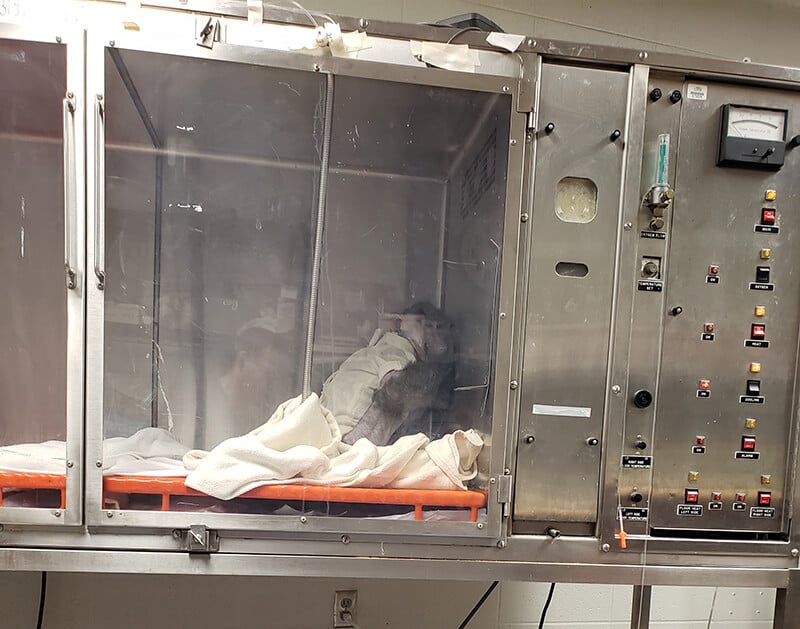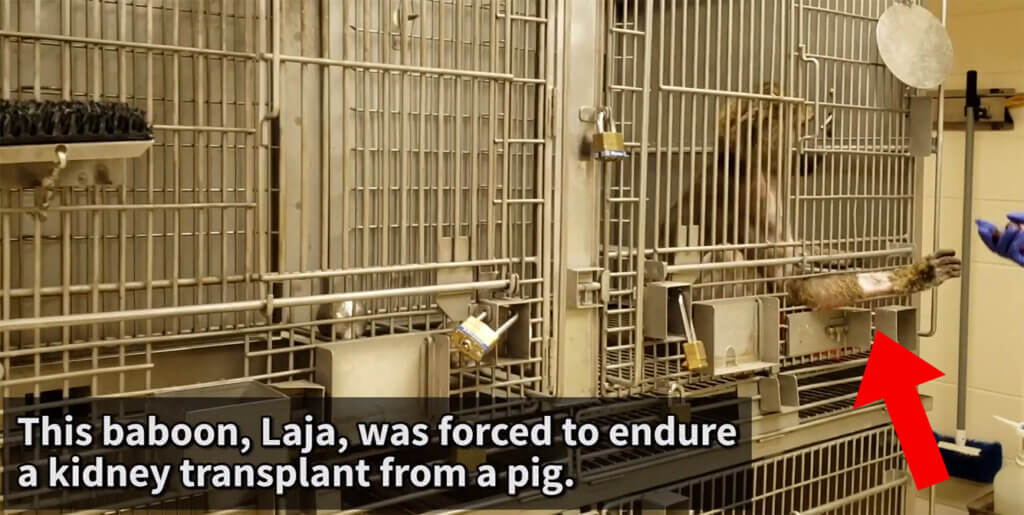All You Need to Know About Xenotransplantation

Experimenters across the U.S. cut organs out of animals and implant them into other species in a process known as xenotransplantation, which aims to make transplanting animal organs into humans a common practice.
But it’s an impractical and ethically corrupt system that exploits sensitive animals, thwarts human health, and risks the widespread transmission of deadly pathogens.
Animals Are Bred for ‘Spare Parts’ on Organ Farms

Genetically engineered pigs are bred and slaughtered for their vital organs on horrid organ factory farms, which are bankrolled by biotech giants such as United Therapeutics and its subsidiary Revivicor. The animals are killed, and their organs are sent to major universities, including the University of Alabama–Birmingham, Columbia University, Johns Hopkins University, New York University, and the University of Maryland.
Baboons and other animals held in the labs of these universities fare no better. Experimenters play a perverse and grisly game of Operation on them, subjecting them to multiple invasive surgeries, removing their organs, and implanting foreign organs as they suffer through a wide range of painful side effects. Some die in the process.
The Ghastly Reality of Xenotransplantation Experiments
A whistleblower blew the lid off a litany of severe animal welfare atrocities inside the school’s xenotransplantation laboratory, including these:
- A baboon, named Laja, was forced to endure a kidney transplant from a pig. Her body rejected it, resulting in psychological distress, painful ulcers and body sores (which experimenters attempted to hide by pouring Woolite laundry detergent on the wounds), and death.
- Another baboon died two days after being subjected to a pig-heart transplant.
- Experimenters plotted to underfeed a pig in order to prevent her from growing so large that her organs would no longer be suitable for transplantation.
A whistleblower leaked to PETA that monkeys were kept in isolation and subjected to multiple invasive surgeries in the school’s laboratory:
- Seventy-eight baboons were subjected to repeated invasive surgeries.
- Experimenters restrained them in a jacket and kept them tethered for up to a week.
- Major organs were removed, and they endured transplants from themselves, other baboons, and pigs.
- They suffered through surgery side effects, which may have included intestinal inflammation, severe diarrhea, abdominal pain, nausea, vomiting, weight loss, untreatable viral disease, bacterial infections, uncontrollable bleeding, and skin rashes.
- They were kept alive for up to 360 days following transplantation.
- Experimenters killed all 78 of them at the end of the experiment.
- Four baboons endured the removal of major organs and a lung transplant from four pigs.
- They suffered through surgery side effects, which may have included pneumonia, seizures, hypothermia, wound infections and skin lesions, diarrhea, weight loss, irregular heartbeat, collapsed lung, uncontrollable bleeding, and death.
- They remained as subjects in the experiment for up to 180 days following transplantation.
Recently deceased humans received pig hearts, and brain-dead humans received pig kidneys.
- Experimenters attached a pig’s kidney to a brain-dead human’s blood vessels.
- Experimenters transplanted two pig hearts into two recently deceased humans.

The Next Pandemic May Be Just an Organ Transplant Away
In January 2022, the University of Maryland Medical Center attempted the first pig-to-human heart transplant. Two months later, the recipient was dead.
The heart, taken from a genetically engineered pig, was infected with porcine cytomegalovirus, a highly common viral infection in pigs that sometimes leads to stillborn piglets. Pre-operation testing failed to detect it.
This grim outcome underscores a fundamental problem in interspecies transplants: They’re unpredictable and dangerous.

Despite that outcome, the University of Maryland Medical Center carried out a second pig-to-human heart transplant in September 2023. The recipient was placed on an experimental antibody treatment to suppress his immune system in order to prevent rejection of the organ but died within six weeks, after the heart began showing signs of rejection.
The potential for animals to transmit infectious pathogens to humans is already a very real risk, as illustrated by the COVID-19 pandemic. Adding animal-to-human organ transplants to the mix could spell disaster.
The medications that transplant patients take to suppress their immune systems make it more difficult for them to fight off pathogens, which also increases the risk of passing infections to other people.
Animals Can’t Opt Out of the Theft of Their Organs
Pigs, baboons, and other animals are sensitive, complex individuals with their own worth and strong social and familial ties. They feel pain and fear, just as you and I do.
They’re not organ toolsheds.

Xenotransplantation is rooted in the speciesist idea that humans have the right to use other animals for our own purposes, right down to stealing the vital organs those animals are already using.
We don’t.

Human Problems Require Human Solutions, Not Pig Hearts
None of this is necessary. Simple changes would save human lives and spare animals.
The flawed opt-in organ donation system in the U.S., for instance, wastes more than 28,000 organs each year. Instituting a presumed- or mandated-consent policy has been successful in other countries.
Organ collection in Belgium more than doubled after the introduction of presumed-consent policies that assume organ donation by default, so people must choose to opt out. Mandated-choice policies that require individuals to make a choice regarding organ donation are also successful elsewhere. Sweden and Denmark increased their donor registry by a collective 750,000 after implementing mandated choice policies.
Increasing public education on the importance of organ donation and dismantling racial-ethnic barriers that hinder some groups from donating would also increase donation numbers.
Animal-free medical advances are already increasing the availability of viable organs, including 3D-printed organs from human cells, extending the time of organ viability via bypass machines after the donor has passed away, and using antiviral medications to allow hepatitis C–positive donations.
Human-Relevant, Animal-Free Science Is the Answer
Bottom line? The organs of pigs, baboons, and all other animals belong to them—not humans. Xenotransplantation is impractical, unethical, and downright dangerous.
That’s why PETA scientists have developed The Research Modernization Deal, which outlines a strategy for optimizing research to cure disease by ending funding for strategies that don’t work and investing in human-relevant research.

Please take a moment to support modern, animal-free science and ask your legislators to support PETA’s Research Modernization Deal:
Then urge the University of Alabama–Birmingham’s president to pull the plug on the school’s transplantation laboratory:
From PETA and executive producer Bill Maher, the new docuseries ‘The Failed Experiment’ exposes what most people don’t know about experiments on animals.